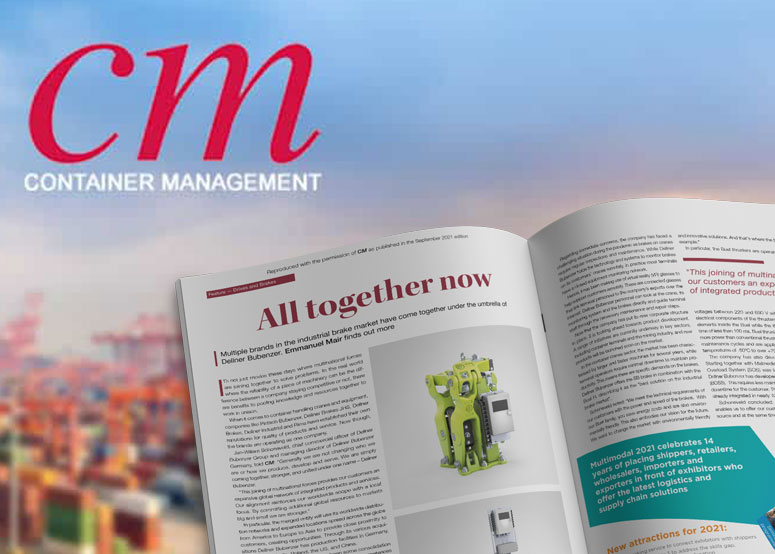All Together Now

Multiple brands in the industrial brake market have come together under the umbrella of Dellner Bubenzer. Emmanuel Mair finds out more
Article Featured in Container Management / Spetember 2021It’s not just movies these days where multinational forces are joining together to solve problems. In the real world where the reliability of a piece of machinery can be the difference between a company staying competitive or not, there are benefits to pooling knowledge and resources together to work in unison.
When it comes to container handling cranes and equipment, companies like Pintsch Bubenzer, Dellner Brakes JHS, Dellner Brakes, Dellner Industrial and Rima have established their own reputations for quality of products and service. Now though, the brands are operating as one company.
Jan-Willem Schoneveld, chief commercial officer of Dellner Bubenzer Group and managing director of Dellner Bubenzer Germany, told CM: “Generally we are not changing who we are or how we produce, develop and serve. We are simply coming together, stronger, and united under one name – Dellner Bubenzer.
“This joining of multinational forces provides our customers an expansive global network of integrated products and services. Our alignment reinforces our worldwide scope with a local focus. By committing additional global resources to markets big and small we are stronger.”
In particular, the merged entity will use its worldwide distribution networks and expanded locations spread across the globe from America to Europe to Asia to provide close proximity to customers, creating opportunities. Through its various acquisitions Dellner Bubenzer has production facilities in Germany, Sweden, Italy, India, Poland, the US, and China.
On the production side, there has been some consolidation and the company has formed different Centres of Competences (CoC) to help it optimize production sites. The manufacturing of the former Pintsch Bamag motor integral brakes has been relocated from the Bamag plant in Dinslaken to the Dellner Bubenzer facility in Kirchen-Wehbach, Germany. The Rima facility in Italy has been retained but is now a CoC for all wheel clamps and rail brakes from both the former Bubenzer and Rima lines.
Service locations include Malaysia, Singapore, the US, Shanghai, Netherlands, Brazil, Sweden and Dubai with more to be launched around the world. These facilities will serve the enlarged company’s portfolio, which now includes clutches.
Schoneveld added: “The biggest advantage is that we learn from each other and benefit from each other because of the years of experience and the history of the companies. Furthermore, we have a state-of-the-art test centre in our R&D centre in Germany, where we regularly test and optimize the entire Dellner Bubenzer product portfolio, so that we can meet our own quality requirements, which is one of the highest priorities for us.
Regarding immediate concerns, the company has faced a challenging situation during the pandemic as brakes on cranes require regular inspections and maintenance. While Dellner Bubenzer holds the technology and systems to monitor brakes on its customers’ cranes remotely, in practice most terminals have a closed equipment monitoring network.
Hence, it has been making use of virtual reality (VR) glasses to help support customers remotely. These are connected glasses that link terminal personnel to the company’s experts over the internet. Dellner Bubenzer personnel can look at the crane, its monitoring system and the brakes directly and guide terminal staff through the necessary maintenance and repair steps.
Now that the company has put its new corporate structure in place, it is looking ahead towards product development. A range of initiatives are currently underway in key sectors, including container terminals and the mining industry, and new products will be launched soon on the market.
In the container cranes sector, the market has been characterized by larger and faster machines for several years, while terminal operators require minimal downtime to maintain productivity. This means there are specific demands on the brakes. Dellner Bubenzer offers the SB brake in combination with the BUEL® H, describing it as the “best solution on the industrial brake market”.
Schoneveld noted: “We meet the technical requirements of our customers with the power and speed of the brakes. With our BUEL® family, you save energy costs and are also environ- mentally friendly. This also embodies our vision for the future. We want to change the market with environmentally friendly and innovative solutions. And that's where the BUEL® is a perfect example.”
In particular, the BUEL® thrusters are operated with 3 phase voltages between 220 and 690 V with 50 or 60 Hz. All the electrical components of the thrusters are protected from the elements inside the BUEL® while the thrusters can reach a set time of less than 100 ms. BUEL® thrusters additionally have 25% more power than conventional thrusters, score high for the least maintenance cycles and are applicable worldwide, between temperatures of -50oC to over +75oC.
The company has also developed anti-snag systems. Starting together with Malmedie and its coupling, the Snag Overload System (SOS) was launched. From this system, Dellner Bubenzer has developed the Brake Only Snag System (BOSS). This requires less maintenance and therefore minimizes downtime for the customer. The BOSS system is certified and already integrated in nearly 100 cranes worldwide.
Schoneveld concluded: “The extended product range enables us to offer our customers worldwide more from one source and at the same time allows us to enter new markets.”
